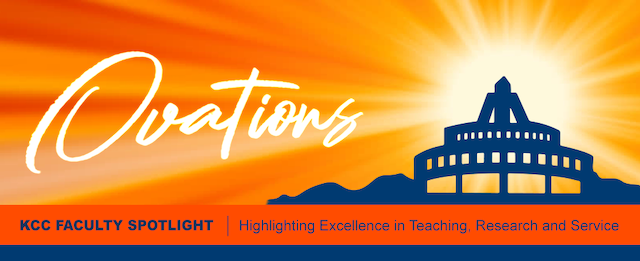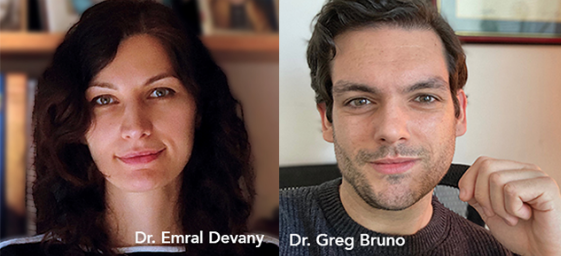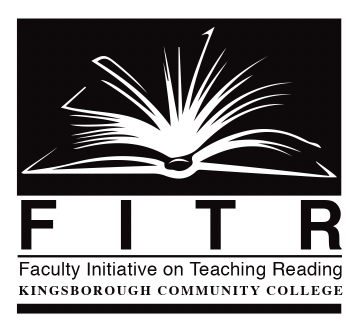Ovations


Award-Winning FITR Program: A Model To Teach Reading Through Innovative Collaboration
The Kingsborough Community College (KCC) Faculty Initiative on Teaching Reading (FITR) has won the 2022 Diana Hacker TYCA Award for Outstanding Programs in English for Two-Year Colleges and Teachers in the category of “Reaching Across Borders.”
Presented annually by the Two-Year College English Association (TYCA) of the National Council of the Teachers of English (NCTE), the award honors two-year college teachers and their colleges for exemplary programs that enhance students’ language learning, helping them to achieve their college, career, and personal goals.

FITR grew out of a longstanding commitment to the teaching of reading, and a commitment to work toward racial justice and educational equity on the KCC campus. In 2017, after conducting research and publishing on the current state of reading on community college campuses, an interdisciplinary group of faculty at KCC, Annie Del Principe (ENG), Libby Garland (HIS), Rachel Ihara (ENG), Laura Kates (BEH/EDU), Emily Schnee (ENG), and Tracy Steffy (HIS), launched the Faculty Initiative on Teaching Reading (FITR).
The founding faculty members researched, conceptualized, and developed a faculty-driven reading initiative to provide Kingsborough instructors with collaborative and interactive opportunities to create reading pedagogies for their specific disciplinary contexts, regardless of the subject matter.
“Effective reading is essential for learning biology. Reading scientific texts is not a simple, read-the-words-in-a-page activity. It requires critical thinking, digesting facts, synthesis of information and frequent revision of conclusions,” explained Dr. Emral Devany, an assistant professor of biology. “In science classes, we often simply assign readings to the students, assuming they already have reading skills or processes. Collaborating with colleagues from other disciplines through FITR helped me see the need to demonstrate reading strategies and show our students how to approach even the most basic scientific texts.”
One notable characteristic of FITR, reflected in its name, is that it is an entirely faculty-generated and faculty-led initiative that places collaborative learning at the center of its work.
FITR has a rotational leadership model. Faculty participants have an opportunity to join the interdisciplinary cohort of seminar leaders, faculty interest group (FIG) facilitators, and symposium planners, and also make up the FITR advisory board. The faculty who have assumed leadership roles in FITR represent a variety of disciplines, including biology, education, English, history, political science, and sociology.
The “Does Reading Matter?” FIG, now in its fourth year, is currently facilitated by Dr. Greg Bruno, assistant professor of English. The group shares common readings, which serve as jumping-off points for discussions on how they relate to the classroom. “The FIG is a great place to extend the dialogue started in FITR. It creates room for faculty members to wrestle with some of the more specific questions brought up in FITR in a much smaller group,” noted Bruno.
“From my perspective as facilitator, I see so much meaningful dialogue happen when we just come together and talk, when we meet over our shared questions, experiences, and expertise,” he added. “Overall, the FIG offers a low-stakes opportunity to collaborate with colleagues and to brainstorm ways to teach reading more effectively.”
Interest in FITR has grown campus-wide over the last four years: Faculty from 15 disciplines in STEM, the social sciences, and the humanities have participated in the seminars; 35 faculty have joined the FIG; and more than 125 faculty, staff, and students have attended the FITR symposia.
The fourth cohort of the semester-long FITR Faculty Seminar, which is the centerpiece of FITR’s work, kicked off in January and will run until May. It is facilitated this year by Esther Gabay (ENG), Ivana Espinet (BEH/ED) and Emral Devany (ENG). Planning is underway for the third annual FITR Symposium.
Impressed with the depth and scope of KCC’s FITR program, the TYCA committee feels it is a model for innovative collaboration that can be replicated in other institutions.
The award will be formally presented at the opening session of the online 2022 TYCA National Conference on March 9th.
For more information about FITR, visit https://fitrkbcc.commons.gc.cuny.edu.
